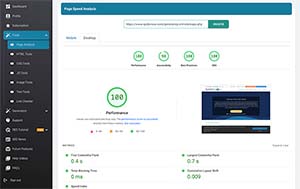The Significance of Website Audits for Digital Success
Website Audits is powerful in the digital realm. An audit evaluates issues to improve rankings quickly.

Understanding Website Audits for SEO
In today's fast-paced digital landscape, your website serves as the virtual storefront of your business, making it crucial to maintain its optimal performance. A website audit, akin to a health checkup for your online presence, plays a pivotal role in identifying issues, areas for improvement, and opportunities for enhancement.A website audit is a systematic and thorough examination of your website's various components. Its primary objective is to uncover issues and provide actionable recommendations. Think of it as a diagnostic tool for your online presence. The importance of website audits cannot be overstated, as they serve multiple critical purposes.
Website audits are essential for optimizing user experience. A seamless and user-friendly website is essential for retaining visitors and encouraging them to explore your content or make purchases. An audit can help pinpoint issues such as slow loading times, broken links, or navigation problems that could frustrate users.
Audits are instrumental in improving search engine visibility. Search engines like Google employ complex algorithms to rank websites. By conducting regular audits, you ensure your site adheres to the latest SEO best practices, increasing your chances of ranking higher in search results.
Website audits enhance security. In an age rife with cyber threats, website security is paramount. Audits can reveal vulnerabilities that might jeopardize your site's integrity and user data, allowing you to address them promptly.
Audits can boost conversions. Whether your website's primary goal is to generate leads, make sales, or encourage specific actions, a well-optimized website can significantly increase conversion rates. Audits can expose obstacles to conversion, such as confusing forms or unclear calls-to-action.
When undertaking a website audit, it's crucial to assess various key components of your website. These components include the technical aspects, content, SEO, user experience, and security.
The technical audit delves into the backend of your website. It evaluates factors such as site speed, mobile-friendliness, and server performance. Slow-loading pages can deter visitors, so audits can pinpoint speed-related issues and recommend solutions to enhance loading times. With the rise of mobile devices, ensuring your website functions seamlessly on smartphones and tablets is vital. Audits ensure your site is responsive and user-friendly across all devices. Additionally, a well-performing server is essential for site stability, and audits assess server-related issues, offering improvements if necessary.
Content is the lifeblood of your website. A content audit evaluates content quality, relevance, and engagement level. High-quality and engaging articles, images, videos, and other content elements are essential for keeping visitors engaged. Content should also align with your target audience's interests and needs. An engaged audience interacts with your content, leaving comments or sharing posts on social media.
Search engine optimization (SEO) is another critical aspect. An SEO audit examines keyword usage, meta tags, and your site's backlink profile. Effective use of relevant keywords throughout your website is essential. Meta tags, including title tags, meta descriptions, and header tags, must be optimized for both search engines and user engagement. Moreover, the quality of the backlinks pointing to your site is crucial for SEO success. Audits assess the quality of these links and identify any toxic links that could harm your SEO efforts.
User experience is vital for retaining visitors and encouraging them to explore your website further. This audit component considers navigation, site structure, and mobile responsiveness. Is your website easy to navigate, with a clear menu structure and logical pathways? Does your site's layout make it simple for users to find what they're looking for? With the increasing use of mobile devices, ensuring your website is equally functional and user-friendly on smartphones and tablets is crucial.
In an era of rising cybersecurity threats, a security audit is imperative. This audit evaluates vulnerabilities and assesses whether you are taking adequate measures to safeguard user data. Detecting weaknesses in your website's security that hackers could exploit is essential for protecting your site and user data.
While DIY website audits are possible, engaging the services of a professional offers several advantages. Professionals have the expertise, tools, and knowledge to conduct a thorough audit, uncovering issues that might otherwise go unnoticed. They stay updated on the latest trends and best practices in web development, SEO, and security.
Furthermore, professionals provide custom solutions tailored to your website's unique needs and objectives. Instead of spending hours deciphering technical jargon and data, you can focus on core business activities while experts handle the audit process. This not only saves you valuable time but also ensures that the audit is conducted effectively and efficiently.
Professional audits set the stage for long-term digital success by addressing underlying issues and providing a roadmap for ongoing improvement. They help your website remain effective and competitive in the ever-evolving online landscape.
Conducting a website audit involves several steps. Before beginning, it's essential to set clear goals and objectives. Define what you want to achieve with the audit and which areas of your website you want to focus on. Gather relevant data and tools to streamline the process.
The audit process typically involves:
- Crawling your website using tools like website crawlers to collect data about your site's structure, links, and content.
- Analyzing the collected data to identify issues and opportunities. Look for patterns, anomalies, and areas that need improvement
- Prioritizing your findings based on their impact on user experience, SEO, security, or conversions.
- Recommending specific solutions to address the identified issues. These recommendations should be actionable, measurable, and aligned with your goals.
- Implementing changes based on the recommendations to improve your website. This may involve technical fixes, content updates, or SEO optimizations.
After implementing changes, it's crucial to monitor the impact. Analyze key performance metrics such as website traffic, bounce rates, conversion rates, and search engine rankings. This post-audit analysis helps you gauge the effectiveness of your efforts and identify areas that may require further attention.
In conclusion, a website audit is not just a routine check-up but a strategic roadmap toward digital success. By regularly evaluating and improving your website's performance, you can elevate user experience, enhance search engine visibility, and ultimately achieve your online goals. Don't wait for issues to accumulate; invest in a website audit today and witness the transformative impact on your digital success. Whether you choose to conduct a DIY audit or enlist the expertise of professionals, the key is to take action and continuously optimize your online presence in the dynamic world of the internet. Your website is your digital storefront; make sure it's always open for business.
The above information is a brief explanation of this technique. To learn more about how we can help your company improve its rankings in the SERPs, contact our team below.

Bryan Williamson
Web Developer & Digital Marketer

Web Developer & Digital Marketer
Digital Marketer and Web Developer focusing on Technical SEO and Website Audits. I spent the past 26 years of my life improving my skillset primarily in Organic SEO and enjoy coming up with new innovative ideas for the industry.













